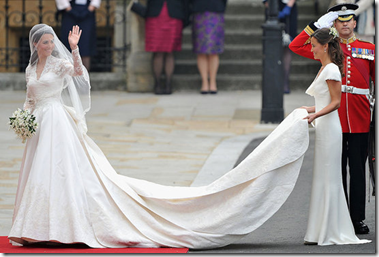Torie Bosch of Slate wrote a piece about a recent debate on Wikipedia over the validity of an entry on Kate Middleton’s bridal gown as a means of illustrating the gender gap that exists amongst Wikipedia’s citizen editors. Only 9 percent of Wiki editors are female, which is actually an improvement over recent years but still exceptionally disproportionate.

Serious efforts have been made to mitigate this gender gap. Wikipedia’s cofounder, Jimmy Wales, recently addressed the problem and has taken action, as have female editors already working on the site. Despite these efforts, female editors, on average, “make fewer changes to articles than male editors” and frequently don’t continue to be active online.”
All of this brings me to Bosch’s title for the piece:
How Kate Middleton’s Wedding Gown Demonstrates Wikipedia’s Woman Problem
I can’t help but wonder if Wikipedia has a woman problem or if women have a Wikipedia problem. While the editorial pages are currently dominated by male editors, anyone is free to make additions, deletions and revisions to the encyclopedia, meaning that women have just as much access to Wikipedia as men. They may have to fight for turf and battle a horde of male editors in order to be heard, but nothing is preventing them from doing so.
Furthermore, the efforts made thus far to involve more female editors have not yielded meaningful results.
I would also argue that the inclusion of Kate Middleton’s wedding gown into the pages of Wikipedia was by no means a slam dunk and not representative of any gender gap. I am glad that there was debate about its inclusion. I’m still not so sure that it belongs in the encyclopedia, but I am confident that if a discussion took place, it’s inclusion is probably justified. This is what makes Wikipedia great. I would also argue that the debate over the dress’s inclusion would have taken place even if female editors outnumbered male editors by a large number.
Like I said, the dress was hardly a slam dunk, regardless of who is editing the site.
I think it’s great that Wikipedia is making efforts to be more inviting and inclusive to women, but at some point, when a subset of people is not taking advantage of an opportunity that is readily available to them, we might need to shift our gaze away from the missed opportunity to the people failing to take advantage of it.
Wikipedia may have a woman problem, but I suspect that the problem is the result of women having a Wikipedia problem.
I’m not sure what the problem might be, but knowing the source of the problem is often the first step in finding a solution.

